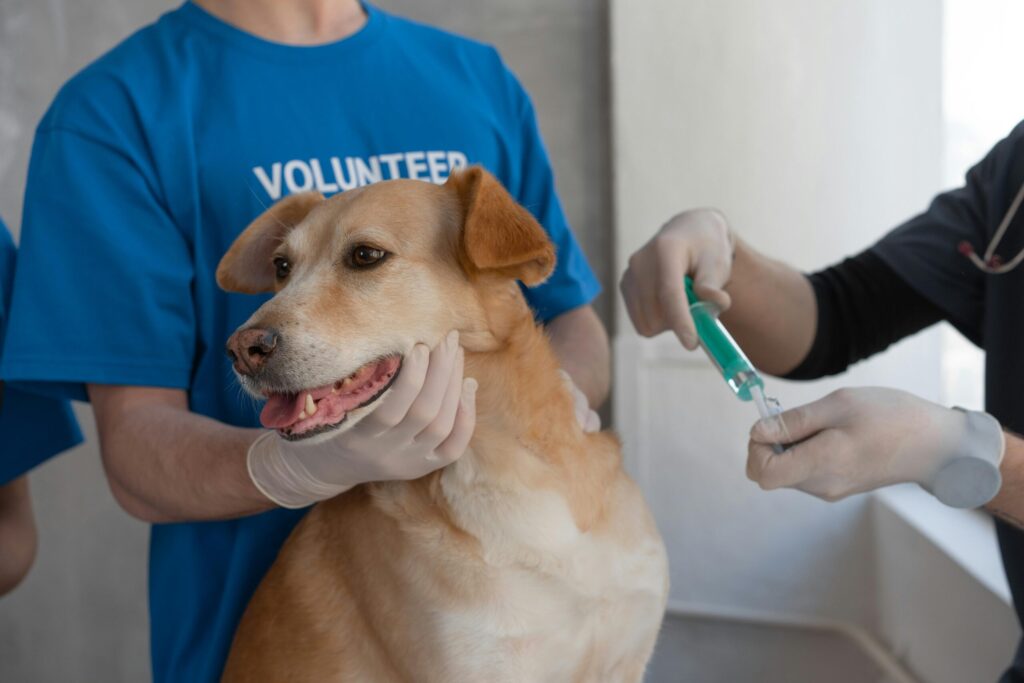Introduction
Caring for a dog’s health in India requires a vigilant routine of vaccinations and deworming. These two crucial measures protect dogs from dangerous infectious diseases and harmful parasites, increasing their lifespan and quality of life. This guide provides detailed insights into why vaccination and deworming are important, explains the timing and schedule for puppies and adult dogs, and offers practical advice to ensure every dog receives the necessary care.
Importance of Vaccination in Dogs
Vaccination is the most effective way to protect dogs against contagious and often fatal diseases. In India, diseases like rabies, canine distemper, parvovirus, and hepatitis can cause severe illness or death if not prevented through vaccination. Rabies is especially critical because of its zoonotic nature—it can be transmitted from dogs to humans—and is legally mandated to be vaccinated against. Vaccines stimulate a dog’s immune system to fight infections, creating antibodies that prevent future illness.
Getting puppies vaccinated early and following through with booster shots is essential to developing and maintaining immunity. Missing or delaying doses weakens protection. Beyond individual protection, vaccination plays a pivotal role in community health by reducing disease transmission between pets and people.
Deworming: Essential for Internal Parasite Control
Deworming aims to eliminate intestinal parasites such as roundworms, hookworms, whipworms, and tapeworms that can debilitate dogs and sometimes infect humans, especially children. These parasites affect digestion, cause anemia, lead to slowed growth, and increase susceptibility to other diseases. Puppies are especially vulnerable as they often inherit worms from their mothers.
Regular deworming lowers the parasite burden and helps maintain digestive health and nutrient absorption. In India’s warm climate, where parasite exposure is common, regular dosing throughout a dog’s life is necessary.
Puppy Vaccination and Deworming Schedule
Puppies require intensive care, as their immune system is immature and maternal antibodies fade quickly. The typical schedule is as follows:
- 2 weeks: First deworming starts to combat inherited parasites.
- 6 to 8 weeks: First dose of polyvalent vaccine (7-in-1 or 9-in-1) protecting against distemper, hepatitis, parvovirus, parainfluenza, leptospirosis, and other illnesses. Deworming continues every 2 to 3 weeks.
- 9 to 10 weeks: Booster dose of polyvalent vaccine reinforcing immunity.
- 12 to 16 weeks: Second booster for polyvalent vaccine and first rabies vaccine dose (rabies vaccination is mandatory by law in India). Continue monthly deworming programs until six months.
- 16 to 18 weeks: Final booster doses including optional vaccines like kennel cough (Bordetella) or canine influenza, if recommended by the vet.
Ensuring each vaccine dose is given on time and following the full series builds robust immunity and better health foundations.

Adult Dog Vaccination and Booster Guidelines
After completing the puppy series, adult dogs generally follow an annual booster vaccination plan.
- Rabies vaccine needs renewal every 1 to 3 years, depending on vaccine type and government regulations.
- Polyvalent vaccines (DHPPiL) that protect against distemper, parvovirus, and other diseases are typically given yearly or triennially based on veterinary advice and exposure risks.
- Non-core vaccines like leptospirosis, kennel cough, or canine influenza are administered according to lifestyle risk (for example, if the dog is kenneled, travels frequently, or lives in high-risk areas).
Adult dog vaccination compliance protects pets from disease outbreaks in their community and ensures that legal requirements are met.
Deworming Schedule for Adult Dogs
For adult dogs, deworming schedules depend on lifestyle and clinical risk but are generally recommended every three to six months. Dogs exposed to outdoor environments, scavenging, or multi-dog homes might need more frequent treatment. A vet may adjust frequency if parasites are detected during routine stool exams or if the dog shows symptoms of infection.
Pairing deworming with regular health checks allows early parasite management and reduces zoonotic risk.
Special Considerations and Best Practices
- Always deworm dogs at least seven days before vaccinations to optimize immune response.
- Post-vaccination, dogs may experience mild lethargy, low fever, or swelling at the injection site; these are normal and transient.
- Keep a meticulous record of all vaccinations and deworming doses; this is vital when consulting your vet or for official documentation.
- Consult your veterinarian regarding any special circumstances such as pregnancy, chronic illness, or travel to tailor vaccination and deworming plans accordingly.
Summary
Adhering to a structured vaccination and deworming schedule is essential to ensure dogs in India live long, healthy lives free from preventable diseases and parasites. Timely vaccines safeguard puppies and adults from deadly infections, while regular deworming eliminates internal parasites that undermine health. Responsible pet ownership includes strict compliance with these schedules, regular veterinary advice, and careful record keeping. Doing so benefits not only the individual dog but also the wider community by limiting the spread of zoonotic diseases. For every dog owner, protecting their beloved pet begins with prevention—vaccinate and deworm on time, every time.



